Raw pig ears are a popular chew treat for dogs, but the question of their safety remains. While dogs can find them delicious, raw pig ears can harbor harmful bacteria like Salmonella and E. coli, posing a risk to both your dog and your family. Understanding the potential benefits and risks is essential for making informed decisions about your dog’s diet.
The Risks of Feeding Raw Pig Ears
Feeding raw pig ears carries several potential health risks. These chewy treats can be contaminated with bacteria such as Salmonella and E. coli, which can cause gastrointestinal issues like vomiting and diarrhea in dogs. More seriously, these bacteria can also pose a risk to humans handling the raw pig ears, especially young children and individuals with compromised immune systems. The risk of contamination is significantly higher with raw pig ears compared to commercially processed pig ear treats.
Furthermore, raw pig ears can be a choking hazard, particularly for puppies or small dogs. They can also be difficult to digest, potentially leading to blockages in the digestive tract.
Are There Any Benefits to Raw Pig Ears?
Despite the risks, some proponents argue that raw pig ears offer certain benefits. They are a natural source of chondroitin and glucosamine, which can support joint health. The act of chewing can also be mentally stimulating for dogs and help to clean their teeth. However, these potential benefits can be obtained from safer alternatives.
Safe Alternatives to Raw Pig Ears
Fortunately, there are many safe and healthy alternatives to raw pig ears. Commercially processed pig ears are treated to eliminate harmful bacteria and are generally considered safe for dogs. Look for pig ears that have been roasted or smoked, rather than raw.
Other chew treats made from bully sticks, sweet potato, or rawhide (under supervision) can also provide similar chewing satisfaction and dental benefits. Always choose treats appropriate for your dog’s size and chewing habits.
Can I give my dog pig ears every day?
While pig ears can be a healthy treat in moderation, they shouldn’t be given to your dog every day. Due to their high fat content, feeding pig ears regularly can contribute to obesity and other health problems, such as pancreatitis. It’s always best to offer a variety of healthy treats and rotate them to ensure your dog receives a balanced diet.
do dogs get sick of eating the same food
What if my dog ate a raw pig ear?
If your dog consumed a raw pig ear, monitor them closely for any signs of illness, such as vomiting, diarrhea, or lethargy. Contact your veterinarian immediately if your dog exhibits any of these symptoms. They can provide guidance and treatment if necessary.
 Dog getting sick from pig ear
Dog getting sick from pig ear
Conclusion
While raw pig ears may seem like a natural treat for dogs, the potential risks of bacterial contamination and health problems outweigh any perceived benefits. Prioritizing your dog’s safety and well-being by opting for safer alternatives is crucial. Always consult with your veterinarian for personalized dietary advice. Processed pig ears and other safe chews can offer the same enjoyment and benefits without compromising your dog’s health.
FAQ
- Are raw pig ears safe for puppies? No, raw pig ears are particularly risky for puppies due to the increased risk of choking and bacterial infection.
- What should I do if my dog shows symptoms of Salmonella poisoning? Contact your veterinarian immediately if your dog exhibits symptoms like vomiting, diarrhea, or lethargy after consuming a raw pig ear.
- Are there any dog breeds that should avoid pig ears altogether? Dogs with sensitive stomachs or a history of pancreatitis should avoid pig ears due to their high fat content. Consult your veterinarian.
- Can I cook raw pig ears to make them safe? While cooking can reduce some bacteria, it cannot guarantee complete elimination and may not address other risks like choking hazards.
- Are there any regulations regarding the sale of raw pig ears for dogs? Regulations vary by state. Always check with local authorities and prioritize reputable suppliers if considering raw treats.
- What are some signs my dog is having a negative reaction to a pig ear treat? Look for vomiting, diarrhea, excessive drooling, lethargy, or difficulty breathing. Contact your veterinarian if you notice any of these signs.
- Can I give my dog a pig ear if they have allergies? If your dog has allergies, consult with your veterinarian before introducing any new treat, including pig ears.
dental chews for dogs with pancreatitis
self adhesive bandage wrap for dogs
Beautdogs.us is your premier destination for all things dog-related. We offer expert advice on dog breeds, care, and products, catering to both new and seasoned dog owners. Our team of experienced veterinarians and dog enthusiasts provide a wealth of knowledge to ensure you can give your furry friend the best possible life. Learn more about how we can help you navigate the wonderful world of dog ownership. Contact us at [email protected] or call us at +1 501-555-7529. Beautdogs.us is committed to providing reliable and engaging information to help you and your canine companion thrive.